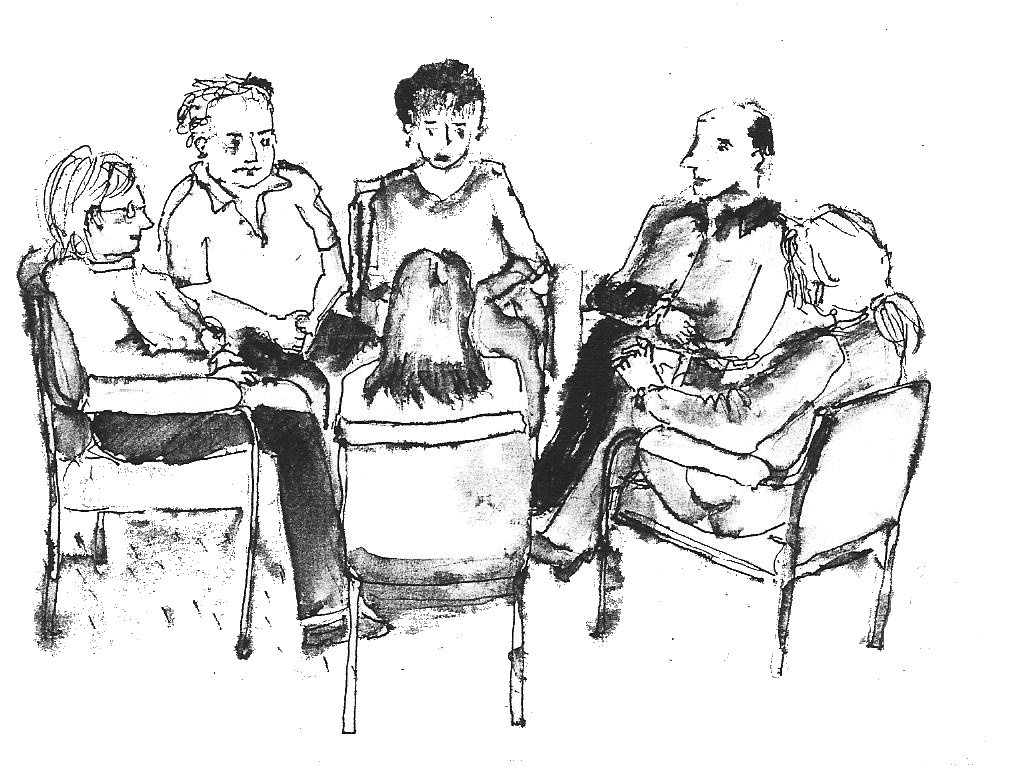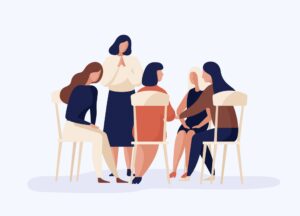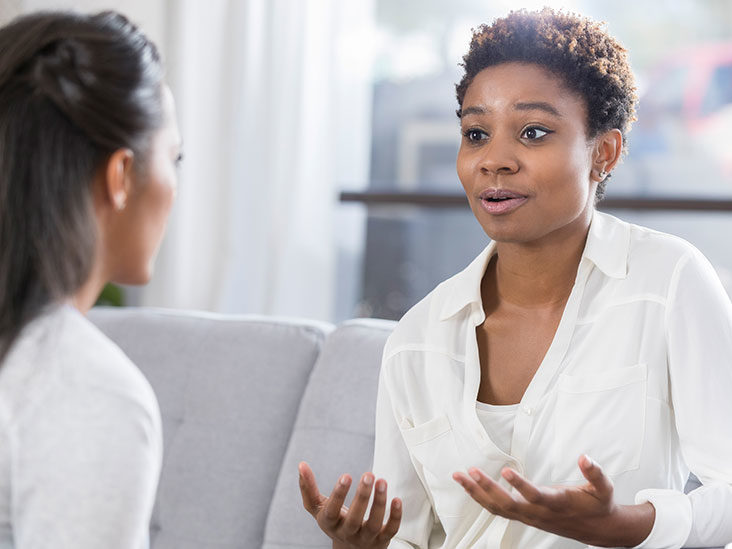Group therapy can be a great way for people to deal with different issues. This type of therapy involves a group of people who meet together to talk about their problems and feelings. In this blog post, we will discuss the benefits of group therapy, as well as how it works. We will also answer some common questions about group therapy. If you are considering attending group therapy, or if you are just curious about it, then this blog post is for you!
Contents
What Is Group Therapy?
 Group therapy is a type of psychological counseling (psychotherapy) that involves one or more therapists working with several people at the same time. The group members all share similar issues, concerns, and/or goals for therapy.
Group therapy is a type of psychological counseling (psychotherapy) that involves one or more therapists working with several people at the same time. The group members all share similar issues, concerns, and/or goals for therapy.
Group therapy is also called group psychotherapy, support groups, self-help groups, and some types of behavioral therapy (e.g., cognitive-behavioral therapy).
The typical size for a good group is six to eight individuals; however, it can be larger or smaller depending on what you are trying to accomplish in your particular group experience (e.g., 12 step programs typically involve large numbers). There can be mixed-gender groups or single-sex groups depending on what the group is designed to accomplish.
What Does Group Therapy Treat?

Group therapy helps people learn about themselves and improve their interpersonal relationships. The members of a therapy group support one another through life’s challenges, share experiences with each other, and work together to solve common problems that can affect any member of the group (e.g., relationship issues). These are some of the problems group therapy treats:
Relationship Issues
Relationship issues are one of the most common reasons people seek group therapy. Group members can provide support and feedback to each other as they work through issues like communication problems, jealousy, affairs, and divorce.
Depression
Depression is a very common mental health problem and one can treat it in group therapy. Members of a therapy group can offer support to each other as they work through their depression and learn new ways to cope with their symptoms.
Anxiety Disorders
People who suffer from anxiety disorders often find relief by participating in group therapy. In a group setting, individuals with anxiety disorders can share their experiences and learn how to deal with their fears. They also have access to support from fellow group members.
Eating Disorders
Group therapy is an effective way to treat eating disorders. Members of a therapy group can provide each other with emotional support and advice as they work through their struggles with eating and body image issues.
Family Issues
Group therapy is often used to help families deal with relationship problems, communication barriers, divorce, or death in the family. In these groups, family members learn new ways of interacting that promote personal growth and stability while reducing conflict among members of the family unit.
Substance Abuse and Addiction Problems
Substance abuse is another common issue addressed in group therapy settings. Group members offer each other support as they recover from addiction by sharing their experiences with addiction recovery programs. Some people also use group therapy to address compulsive behaviors such as gambling addiction and sex addiction.
PTSD, Trauma, and Sexual Abuse
Group therapy can be an effective tool for people who suffer from PTSD or other traumatic experiences (e.g., war veterans). In a group setting, members of the group share their experiences with trauma and learn new ways to cope with their feelings of distress. Group members also support each other by offering emotional support when they are in need of it most.
Grief
When someone is grieving over losing a loved one or dealing with another type of loss (e.g., divorce), he/she may benefit from participating in a grief therapy group where members share their experiences and offer each other emotional support during this difficult time. The goal of grief therapy is to help people cope with their loss and eventually move on with their lives.
Group Therapy Sessions
 A typical session lasts from 60 to 90 minutes and takes place once a week, although you can arrange more frequent sessions. Some groups meet for a set period of time (e.g., 12 weeks) and then end; others are ongoing with no predetermined length of time.
A typical session lasts from 60 to 90 minutes and takes place once a week, although you can arrange more frequent sessions. Some groups meet for a set period of time (e.g., 12 weeks) and then end; others are ongoing with no predetermined length of time.
You may choose to join an existing group that has already been meeting for some time or you may start your own group around issues in which you are interested with people who share similar concerns/goals as yourself. Group therapy is typically less expensive than individual sessions because the counselor works with several clients at one time; however, this depends on how many people are in the group, where it is located, and other factors.
Who Participates In Group Therapy?
People from all walks of life participate in group therapy. Some groups are designed specifically for certain populations (e.g., cancer survivors), while others are open to anyone who wishes to attend. You do not need a mental health diagnosis to join a group; however, you should always consult with the therapist leading the group to see if it is appropriate for you.
These people also participate in group therapy:
- People who have a diagnosis of mental illness such as depression or anxiety disorders
- Grieving people, including those experiencing divorce and/or the loss of loved ones to death. Those dealing with substance abuse problems.
- Survivors of physical and sexual trauma, war veterans, and other survivors of life-threatening experiences (e.g., natural disasters). People recovering from surgery or serious illness; for example, groups that include women receiving treatment for breast cancer can be very powerful experiences as they journey through their disease together.
- People who are in the process of changing their life patterns (e.g., people who are working on improving self-esteem or interpersonal relationships, those who wish to recover from an addiction).
What Happens In Group Therapy?

The whole group meets periodically (usually weekly) and is guided by a therapist. The therapist serves as a facilitator for the group, allowing members to discuss issues that affect them and giving feedback about how each member’s behavior affects others in the group.
The size and structure of your particular group will depend on what you want to accomplish with it. For example, some groups have more than one leader while others may be led only by one person; some groups last for a set period of time while others continue indefinitely until you decide that you no longer wish to attend.
Some groups are structured like classes and have a set curriculum; others are more open-ended with less structure. In some cases, the leader may assign homework for members to do between sessions or it can be done on your own without being assigned by anyone else (e.g., research). Each group will differ based upon what is most helpful for its members at any given time in their lives so there’s no one way of doing things here – flexibility works well!
You’ll find that most people enjoy participating because they’re able to share experiences and feelings with other individuals who have been through similar situations as themselves which makes them feel less alone than before joining up together.
Benefits of Group Therapy

There are many benefits of group therapy. The first and most obvious is that you are not alone in your struggles; others have faced similar challenges and can offer support. Some of these benefits are:
Develops Communication
Group therapy always helps to develop communication skills. You learn to give and receive feedback in a constructive manner, which is essential for interacting effectively with others both inside and outside of the therapy setting.
Boosts Self-Esteem
Group therapy can be very powerful in boosting self-esteem. Listening to others share their stories and struggles often makes us realize that we are not alone in our experiences, thoughts, and feelings. This can be incredibly validating and help to build self-esteem.
Provides Hope
When we struggle with problems or feel overwhelmed by life’s challenges, it is easy to become discouraged and lose hope. Hearing other group members share how they have coped or overcome similar difficulties can provide hope that change is possible.
Allows You To Learn New Skills
Through watching how other group members handle situations, we can learn new coping skills and ways to manage our emotions that may not have occurred to us before.
Teaches You About Yourself & Others
Group therapy always provides an opportunity for self-discovery. We learn about ourselves by watching how we interact with others, both in and out of the therapy setting. This type of exploration can be very valuable in helping to develop a more accurate sense of who we are.
Facilitates Relationship Development
One of the most important outcomes of group therapy is the development of healthy and supportive relationships with other people. These relationships can provide a sense of connection, support, and love that is often missing from our lives.
Offers Variety Of Perspectives
In any given group there will be a variety of different perspectives represented. This can be helpful in understanding complex situations or problems as it allows you to see them from multiple angles. It also helps you to develop a greater understanding and tolerance for different points of view.
Makes You Feel Less Alone
The most important benefit of group therapy is the support you’ll receive from others. It can be very healing to know that there are other people who understand what you’re going through and have been able to overcome similar challenges in their lives. This knowledge alone can help you feel less isolated as you work towards making changes in your own lives.
Side-Effects of Group Therapy

There are many side-effects of group therapy, but most of them are positive. Some side-effects include:
Affects Different People Differently
Group therapy will affect different people differently. Some may find it helpful to talk openly about their feelings and share experiences with others, while others may prefer to listen and not share as much. It is important to remember that there is no wrong way to participate in group therapy – just what works best for you.
Can Be Overwhelming
The amount of sharing that takes place in group therapy can be overwhelming for some people. It is important to take time out if needed and to never feel pressured into sharing more than you are comfortable doing.
Might Stir Up Feelings
It is natural for group therapy to stir up feelings, both positive and negative. This is because we are exposing ourselves emotionally by talking about our experiences and thoughts. It is important to remember that these feelings are often temporary and will pass as you process what it shares.
Can Trigger A Mental Health Crisis
Group therapy can sometimes trigger a mental health crisis, especially for those who have suffered trauma or abuse in the past. If you feel like this might be happening to you then it is best not to attend sessions until your psychiatrist says otherwise (this may mean taking some time off from work).
Possible Lack of Support
It is possible that there are people within your group who do not offer support for one reason or another – this could be due to their own issues which they need professional help with before being able to offer this type of assistance. It is also possible that they may not believe in the process itself or perhaps feel like it’s too much work/time involved so choose not to participate as fully as others around them do.
Alternatives of Group Therapy

There are many alternatives to group therapy that can be used as a substitute or in addition to traditional methods of counseling. Some alternatives include:
Individual Counseling
This is where you meet with one person for your session instead of several at once like what happens during group therapy sessions. This might help if there are certain topics that make you uncomfortable talking about in public (e.g., sexual abuse). Also, it allows more time per person so each individual gets their own personalized treatment plan based on his/her needs and goals without having to worry about anyone else’s opinions or reactions while they’re being talked through things together as part of the same process!
Online Group Chat Sessions
These types of groups allow people from all over the world who have similar interests to gather and communicate with one another. This can be really helpful for people who feel shy or uncomfortable in person-to-person group settings, or those who live in rural areas where there are no groups available to them locally.
Self-Help Books/Workbooks
There are many self-help books and workbooks on the market that focus on different topics related to mental health (e.g., anxiety, depression, bipolar disorder). These can often be very helpful when used in conjunction with other forms of therapy such as individual counseling or online group chat sessions.
Conclusion
Group therapy is a type of treatment that involves meeting with several other people. It involves talking about your feelings in order to improve mental health. This may be done individually or as part of a group session where there are many individuals present at one time, but all participating together on their own terms rather than any specific program being followed by everyone involved simultaneously.
The goal is for each individual member to feel comfortable sharing their thoughts without fear of judgment from others who might not understand what they’re going through due to lack of knowledge about similar experiences – so long as it doesn’t interfere with anyone else’s therapy goals/needs either way.
A Word From Therapy Mantra
Your mental health — your psychological, emotional, and social well-being — has an impact on every aspect of your life. Positive mental health essentially allows you to effectively deal with life’s everyday challenges.
At Mantra Care, we have a team of therapists who provide affordable online therapy to assist you with issues such as depression, anxiety, stress, relationship, OCD, LGBTQ, and PTSD. You can take our mental health test. You can also book a free therapy or download our free Android or iOS app.


